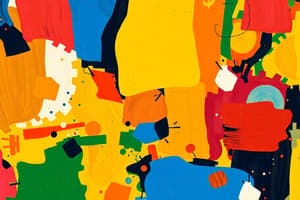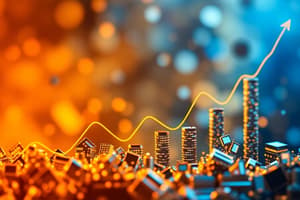Podcast
Questions and Answers
Which of the following statements accurately describes the aims of the business economics module?
Which of the following statements accurately describes the aims of the business economics module?
- To provide a thorough understanding of economic policies and their relevance to households.
- To teach students about the intricacies of personal finance management.
- To introduce core theoretical models in economics for analyzing real-world markets. (correct)
- To prepare students exclusively for macroeconomic analysis.
What is a primary learning outcome of the business economics course?
What is a primary learning outcome of the business economics course?
- To gather and present historical economic statistics.
- To describe and analyze economic data in relation to economic theory. (correct)
- To memorize financial formulas for market analysis.
- To critique the ethical implications of business decisions.
What do economists use economic models to achieve?
What do economists use economic models to achieve?
- To distract businesses from focusing on actual market conditions.
- To develop accurate forecasts that are always guaranteed to be correct.
- To simplify the complexity of human behavior in economic scenarios. (correct)
- To manipulate market variables for profit maximization.
What is the primary focus of microeconomics?
What is the primary focus of microeconomics?
In which category does the term 'opportunity cost' primarily fall within economic analysis?
In which category does the term 'opportunity cost' primarily fall within economic analysis?
Why is it important to understand both micro and macro economics in the business economics module?
Why is it important to understand both micro and macro economics in the business economics module?
What does the term 'mixed economy' refer to?
What does the term 'mixed economy' refer to?
Which economic concept refers to the limitation of resources in fulfilling all desires?
Which economic concept refers to the limitation of resources in fulfilling all desires?
Which statement best describes normative economic statements?
Which statement best describes normative economic statements?
What distinguishes positive economics from normative economics?
What distinguishes positive economics from normative economics?
What is the role of economics in resource allocation?
What is the role of economics in resource allocation?
Which of the following best defines macroeconomics?
Which of the following best defines macroeconomics?
In terms of delivery structure, how is the business economics module organized?
In terms of delivery structure, how is the business economics module organized?
How can economies be characterized in terms of pricing and allocation decisions?
How can economies be characterized in terms of pricing and allocation decisions?
What is the main challenge that economics addresses?
What is the main challenge that economics addresses?
Which of the following options best describes the meaning of 'economic systems'?
Which of the following options best describes the meaning of 'economic systems'?
What role do economists take on when making normative statements?
What role do economists take on when making normative statements?
What does the scarcity principle imply?
What does the scarcity principle imply?
According to the ideas presented, what is a characteristic of free goods?
According to the ideas presented, what is a characteristic of free goods?
What might happen to Oman's economy if oil prices were to increase?
What might happen to Oman's economy if oil prices were to increase?
What does Keynes imply about the influence of economists and political philosophers?
What does Keynes imply about the influence of economists and political philosophers?
Why might top athletes choose to pursue their professional careers over higher education?
Why might top athletes choose to pursue their professional careers over higher education?
Which of the following best captures the idea of 'no-free-lunch' theory?
Which of the following best captures the idea of 'no-free-lunch' theory?
What does a production possibility frontier represent?
What does a production possibility frontier represent?
Which of the following could be considered a sign of thinking like an economist?
Which of the following could be considered a sign of thinking like an economist?
Which of the following points on the production possibility frontier represents efficiency?
Which of the following points on the production possibility frontier represents efficiency?
Which scenario best exemplifies microeconomics?
Which scenario best exemplifies microeconomics?
How can opportunity cost be defined in the context of the production possibility frontier?
How can opportunity cost be defined in the context of the production possibility frontier?
In which of the following scenarios would the production possibility frontier shift outwards?
In which of the following scenarios would the production possibility frontier shift outwards?
What does a cost-benefit analysis involve when making a decision?
What does a cost-benefit analysis involve when making a decision?
In the example regarding walking downtown to save OMR10 on a game, what represents the opportunity cost if the cost of making the trip is $13?
In the example regarding walking downtown to save OMR10 on a game, what represents the opportunity cost if the cost of making the trip is $13?
What is the definition of opportunity cost?
What is the definition of opportunity cost?
What challenge is highlighted in applying the cost-benefit analysis?
What challenge is highlighted in applying the cost-benefit analysis?
What happens if you find that the cost of making a trip to save money is higher than the cash saved?
What happens if you find that the cost of making a trip to save money is higher than the cash saved?
How do economists typically resolve trade-offs?
How do economists typically resolve trade-offs?
If Bill Gates buys more houses without cutting other expenses, does he experience scarcity?
If Bill Gates buys more houses without cutting other expenses, does he experience scarcity?
What type of costs are included in the concept of opportunity costs?
What type of costs are included in the concept of opportunity costs?
Flashcards are hidden until you start studying
Study Notes
Business Economics Module Aims
- To understand the core principles of economics and how these principles apply to business decision-making.
- To develop analytical and problem-solving skills relevant to business and economic contexts.
- To provide a framework for understanding and evaluating real-world economic issues that affect businesses.
Learning Outcomes of the Business Economics Course
- Students gain the ability to analyze and interpret economic data to make sound business decisions.
Economic Models
- Economists use economic models to simplify complex scenarios and understand the relationships between different economic variables.
Microeconomics
- Microeconomics focuses on individual economic units, such as households, firms, and markets.
Opportunity Cost
- Opportunity cost is the value of the next best alternative foregone when making a choice. It falls under cost analysis in economic analysis.
Importance of Micro and Macroeconomics
- Understanding both micro and macroeconomics is essential for comprehending the overall economic environment and its impact on businesses.
Mixed Economy
- A mixed economy combines elements of both free-market and centrally planned economies. This means the government plays a role in directing the economy, but there is also a private sector.
Scarcity
- The limitation of resources, especially compared to the unlimited desires of individuals or society, is known as scarcity. This fundamental concept is key to understanding economics.
Normative Economic Statements
- Normative economic statements are based on opinions, beliefs, and values. They express what ought to be rather than what is and often use value judgments.
Distinguishing Positive and Normative Economics
- Positive economics deals with objective statements that can be tested and verified.
- Normative economics involves subjective statements, opinions, and value judgments.
Economics and Resource Allocation
- Economics plays a crucial role in deciding how scarce resources are distributed and used to satisfy the needs and wants of individuals and society.
Macroeconomics
- Macroeconomics examines aggregate economic phenomena, such as national income, inflation, unemployment, and economic growth.
Delivery Structure of Business Economics Module
- Typically organized as a course with lectures, discussions, group work, and assignments.
Characterization of Economies
- Economies can be characterized by their pricing and allocation decisions.
- Market economies rely on price signals, while centrally planned economies rely on government allocation.
Key Challenge in Economics
- The central challenge in economics is how to effectively allocate scarce resources to meet unlimited wants.
Economic Systems
- Economic systems define the rules and processes for resource allocation and production activities.
Normative Statements and Economists
- Economists acting in their role of policymakers or advisors may make normative statements, introducing their personal value judgments into economic discussions.
Scarcity Principle
- Implies that choices must be made due to the limitation of resources. This forces individuals and societies to prioritize and make trade-offs.
Free Goods
- Free goods are typically abundant and have zero opportunity cost, meaning there is no cost associated with their consumption or use.
Oil Price Increase and Oman's Economy
- A significant increase in oil prices could positively impact Oman's economy, leading to higher government revenue and potentially stimulating growth in oil-related sectors. However, it could also negatively impact non-oil sectors, making them less competitive.
Economists and Political Philosophers
- Keynes suggests that economists and political philosophers have a significant influence on policy decisions, shaping the direction of economic policies.
Top Athletes and Higher Education
- Top athletes may choose professional careers over higher education because of potential for high earnings and limited opportunities for career advancement in sports.
No-Free-Lunch Theory
- This theory suggests that all choices have associated costs, even if they appear free. There is always an opportunity cost involved in a choice.
Production Possibility Frontier (PPF)
- Represents the different combinations of two goods that an economy can produce with its given resources and technology, illustrating the trade-offs involved.
Thinking Like an Economist
- Identifying and analyzing incentives, understanding opportunity costs, and using marginal analysis are signs of thinking like an economist.
PPF Efficiency
- A point on the PPF represents efficient use of resources, meaning the economy is producing the maximum possible output of both goods.
Microeconomics Scenario
- A decision by a firm on how many workers to hire exemplifies microeconomics, focusing on the individual decision-making of a firm.
PPF and Opportunity Cost
- In the context of the PPF, opportunity cost is the amount of one good that must be given up to produce more of another good.
Shifts in PPF
- Technological advancements, increased resources, or improved education can shift the PPF outwards, indicating increased potential output.
Cost-Benefit Analysis
- A cost-benefit analysis involves weighing the potential gains (benefits) against the potential losses (costs) of a decision.
Opportunity Cost Example (Walking Downtown)
- In the example of choosing to walk downtown to save OMR10 on a game, the $13 cost of the trip represents the opportunity cost if you choose to walk.
Definition of Opportunity Cost
- Opportunity cost is the value of the best alternative foregone when making a decision.
Challenge of Cost-Benefit Analysis
- The challenge lies in accurately quantifying and comparing the benefits and costs, often requiring subjective judgments and estimations.
Higher Cost than Savings
- If the cost of making a trip to save money is higher than the cash saved, it signals a loss in terms of economic efficiency.
Resolving Trade-offs
- Economists often use marginal analysis, comparing the additional cost of one more unit with the additional benefit, to help make decisions and resolve trade-offs.
Bill Gates and Scarcity
- While Bill Gates has a great deal of wealth, the scarcity principle still applies. Even with significant resources, he still faces limitations and must make choices about how to allocate his funds.
Opportunity Cost Types
- Opportunity costs encompass both explicit (out-of-pocket) costs and implicit (foregone) costs, such as the value of time or other opportunities given up.
Studying That Suits You
Use AI to generate personalized quizzes and flashcards to suit your learning preferences.




